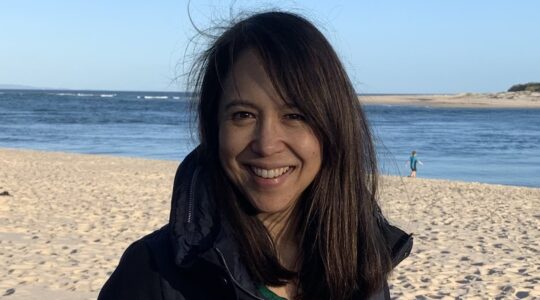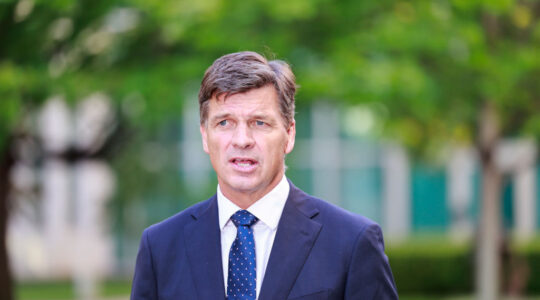By Michelle Grattan
The Albanese government has been re-elected with a substantially increased majority, and Opposition Leader Peter Dutton has lost his seat, in a crushing defeat of the Coalition.
As of late Saturday night, there was a two-party swing to Labor of about 3.4 percent, with two-party vote of 55.5 percent-44.5 percent.
It was sitting on about 86 seats (up from 78), and in the hunt for more. The Coalition, which went into the election with 57 seats, has won 41, and may pick up one or two more.
The Labor primary vote was 34.7 percent, up 2.1 percent; the Coalition primary vote was 31.1 percent, down 4.6 percent.
Among the Liberal losses is frontbencher Michael Sukkar in his Victorian seat of Deakin. Shadow foreign minister David Coleman is likely to lose his Sydney seat of Banks. Outspoken Liberal backbencher Bridget Archer has lost her Tasmanian seat of Bass.
It was all over by 8.30pm, as it became increasingly clear a big swing to Labor was underway.
A trumphant and emotional Anthony Albanese told a jubilant Labor crowd: “Australians have chosen a majority Labor government”.
“Today the Australian people have voted for Australian values. For fairness, aspiration and opportunity for all. For the strength to show courage in adversity and kindness to those in need.
“And Australians have voted for a future that holds true to these values, a future built on everything that brings us together as Australians and everything that sets our nation apart from the world.
“Australians have chosen to face global challenges the Australian way, looking after each other while building for the future.
“I make this solemn pledge. We will not forget that we will never take it for granted, repaying your trust will drive a government each and every day of the next three years.”
Albanese, who has used a Medicare card as a prop through the campaign, produced it once again. “We will be a government that helps every Australian who relies on Medicare.”
According to the ABC, seats changing hands from the Liberals to Labor are Banks and Hughes in NSW; Forde, Bonner, Dickson, Petrie, Leichhardt in Queensland; Deakin in Victoria; Braddon and Bass in Tasmania; Sturt in South Australia, and Moore in Western Australia.
It was a bad night for the Greens. They are likely to lose two of their three Queensland seats, Griffith, held by high profile MP Max Chandler-Mather, and Brisbane held by Stephen Bates.
The Greens’ expected losses occurred despite roughly holding its primary vote, which is 12.5%, up 0.2%. Their leader Adam Bandt is in trouble in his seat of Melbourne.
Dutton said in his concession speech he had called Albanese and congratulated him. “I said to the prime minister that his mum would be incredibly proud of his achievement tonight, and he should be very proud of what he’s achieved.”
Dutton said he had also spoken to Ali France, the Labor candidate who has beaten him in Dickson. “She lost her son Henry, which is a tragic circumstance that no parent should ever go through. And equally I said to Ali that her son Henry would be incredibly proud of her tonight and that she’ll do a good Local member for Dixon.”
He expressed his sorrow for the Liberal MPs and candidates who had lost.
All the teals have held their seats. The teal candidate in Bradfield, Nicolette Boele, is ahead of her Liberal opponent. The teal Jessie Price is also ahead in the ACT Labor seat of Bean.
Queensland LNP Senator James McGrath said it was a brutal night for Peter Dutton and the Coalition. “We have got to make sure we take stock of why we lost this election and have a serious review into those reasons.”
As the Liberals prepare to review their disastrous loss and choose a new leader, their Senate leader Michaelia Cash is backing fellow West Australian Andrew Hastie. “I think Andrew Hastie is an outstanding member … I’m a very good friend of his. Andrew’s always been seen as leadership material.”
The result was a dramatic parallel with what happened in Canada at the beginning of this week.
An opposition that a few months ago had looked just possibly on track to dislodge the government, or at least run it close, has bombed spectacularly.
Mr Dutton lost his Queensland seat of Dickson, as did the Conservative leader Pierre Poilievre in Canada.
Labor’s strong victory reflects not just the voters’ judgement that the Coalition was not ready to govern. It was worse than that. People just didn’t rate the Coalition or its offerings.
Multiple factors played into this debacle for the Coalition.
A first-term government historically gets a chance of a second term. The Trump factor overshadowed this election. It made people feel it was best to stick with the status quo. People also were very suspicious of Dutton, whom they saw (despite disclaimers) as being too like the hardline US president.
After the last election, Mr Dutton was declared by many to be unelectable, and that proved absolutely to be the case, despite what turned out to be a misleading impression when the polls were so bad for Labor.
Even if they’d had a very good campaign, the Coalition would probably not have had a serious chance of winning this election.
But its campaign was woeful. The nuclear policy was a drag and a distraction. Holding back policy until late was a bad call. When the policies came, they were often thin and badly prepared. The ambitious defence policy had no detail. The gas reservation scheme had belated modelling.
The forced backflip on working from home, and the late decision to offer a tax offset, were other examples of disaster in the campaign.
Dutton must wear the main share of the blame. He kept strategy and tactics close to his chest.
But the performance of the opposition frontbench, with a few exceptions, has been woeful. Shadow Treasurer Angus Taylor and finance spokeswoman Jane Hume have been no match for their Labor counterparts Jim Chalmers and Katy Gallagher.
Prime Minister Albanese and Labor ran a very disciplined campaign. Albanese himself performed much better than he did in 2022.
Labor was helped by an interest rate cut in February and the prospect of another to come later this month.
Albanese transformed himself, or was transformed, from last year to this year.
The cost of living presented a huge hurdle for Labor, but the government was able to point to relief it had given on energy bills, tax and much else. The Coalition had opposed several of Labor’s measures and was left trying to play catch-up at the end.
The Liberal Party now has an enormous task to rebuild. The “target the suburbs” strategy has failed. At the same time, the old inner-city Liberal heartland is deeply teal territory.
Hume said, in an unfortunately colourful comment, on Friday, “You do not read the entrails until you have gutted the chicken”.
The chicken has now been gutted. There will be a much more bitter post mortem than in 2022. The leadership choices are less than optimal for the party: Angus Taylor? Andrew Hastie? Sussan Ley?
An interesting thought: if Josh Frydenberg had held his seat in 2022, and led the Liberal party to this election, would be result have been better? One thing is clear: Frydenberg took the right decision in not recontesting Kooyong, which teal Monique Ryan has held.
Anyway, who would want to lead the Liberals at this moment.
– Michelle Grattan is a Professorial Fellow, University of Canberra.
This article was first published in The Conversation.








